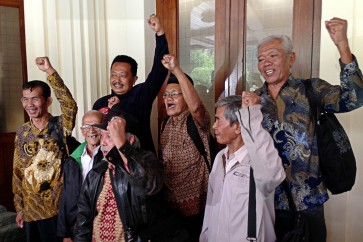Popular Reads
Top Results
Can't find what you're looking for?
View all search resultsPopular Reads
Top Results
Can't find what you're looking for?
View all search results1965 survivors seek closure as UK documents expose Western complicity in mass killings
The newly declassified documents add to a body of evidence of Western involvement in Indonesia’s 1965 anticommunist massacre.
Change text size
Gift Premium Articles
to Anyone
 Members of the Foundation for Victims of the 1965/1966 Killings (YPKP 65) report on the discovery of scores of mass graves from the 1965-66 anticommunist violence across Java and Sumatra in a meeting with then-coordinating political, legal and security affairs minister Luhut Binsar Pandjaitan in this file photo. (thejakartapost.com/Viriya Paramita Singgih)
Members of the Foundation for Victims of the 1965/1966 Killings (YPKP 65) report on the discovery of scores of mass graves from the 1965-66 anticommunist violence across Java and Sumatra in a meeting with then-coordinating political, legal and security affairs minister Luhut Binsar Pandjaitan in this file photo. (thejakartapost.com/Viriya Paramita Singgih)
O
n Oct. 5, 1965, 7-year-old Ita Fatia Nadia was told by her mother that she and her four siblings needed to leave home and go into hiding separately.
The night before, she had gathered all her father’s books from the bookshelves and hid them in a well near her house. They were the books her father often read with his friends, written in German, Dutch and English, about Marxism.
Ita’s father, who was part of the Pemuda Pathuk – a group of young people who resisted the Japanese occupation around Pathuk, Yogyakarta, during and after World War II – and a member of the underground left-wing Indonesian Socialist Party (PSI), was nowhere to be found when Indonesian Army soldiers came by and inspected her house in the following days.
Ita repeatedly asked her mother what had happened but was told to keep quiet. She then heard on the radio that six generals had been killed not long before. But it was the unusual absence of her father that bothered her.
“Your father needed to go somewhere. Now, we pray that he is safe and nothing happened to him,” said her mother.
Ita left with her sister and went into hiding at a family friend’s house close to her home. The family reunited two weeks later, but still without Ita’s father.
She watched as other members of her family and neighbors went missing only to find out later that they had been killed.

















